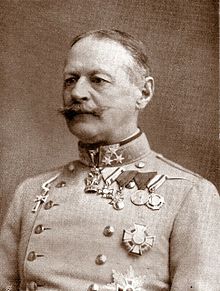Alexander von Krobatin
Alexander Krobatin 1881, Knights of Krobatin , from 1915 Baron Krobatin , 1919 Alexander Krobatin (* 12. September 1849 in Olomouc , Moravia ; † 28 December 1933 in Vienna ) was an Austria-Hungarian army commander , imperial field marshal and war minister of Austria-Hungary .
Life
family
On April 24, 1881 he was raised in Vienna with the diploma of June 10, 1881 (together with the brothers Oberleutnant Friedrich and Captain Alexander and the sisters Maria and Johanna Krobatin ) through to the Austrian knighthood .
On December 15, 1915 (only for Alexander Ritter von Krobatin ) the elevation to the Austrian baron class followed . On April 17, 1916, Franz Joseph I approved the transfer of the baron status, name and coat of arms of Alexander Freiherrn von Krobatin to his nephew, Alexander Franz Friedrich Krill , born in Vienna in 1888 , who was then allowed to call himself Freiherr von Krill-Krobatin .
Minister of War
From 1912 to April 10, 1917 he was Austro-Hungarian War Minister, but resigned from his political office in 1917 as a result of an affair in connection with army supplies. His successor in the ministerial office was Colonel General Rudolf Freiherr Stöger-Steiner von Steinstätten .
At the Council of Ministers for Common Affairs on January 7, 1916, the War Minister had illusions about the possibility of England being defeated by a German landing and German airships.
“ If Serbia were not deleted from the map, the monarchy would be in a similar situation to 1914 in 10 to 20 years. Serbia cannot be compared with Belgium , it is a poor country, in his opinion the whole remaining part of Serbia should be included Hungary defeated and divided into 4 counties . The one and a half million Serbs involved could not possibly be dangerous to a vigorous state like Hungary . "
Krobatin considered the settlement question to be very important and saw in the settlement of state-loyal colonists a very suitable means of reducing the Serbian danger. For him, too, the danger of an independent Serbia was much greater. In his opinion, a smaller Montenegro cut off from the sea could not be dangerous. The Minister of War showed little insight into the confusing Albanian situation. He viewed the annexation of Poland more as a weakening than a strengthening of the monarchy. Germany would not agree either, which is why one would have to come to terms with a division, because an independent Poland would be entirely under German influence.
Army commander
On April 8, 1917 Krobatin was dismissed as minister and appointed commander of the Austro-Hungarian 10th Army on the Isonzo Front . After a reorganization of the army, he was successful in the Twelfth Battle of Isonzo . On November 5, 1917 Colonel General von Krobatin was appointed field marshal . During the June offensive of 1918 , however, his army's attack failed. Krobatin represented Archduke Joseph from October 26, 1918 until the end of the war as commander of Army Group Tyrol . After returning to Vienna, he retired on December 1, 1918. He lived withdrawn in Vienna until his death in 1933.
The Krobatinkaserne in St. Johann im Pongau is named after him .
literature
- Walter Wagner : Krobat, Alexander Freiherr von. In: New German Biography (NDB). Volume 13, Duncker & Humblot, Berlin 1982, ISBN 3-428-00194-X , p. 55 ( digitized version ).
- Kiszling: Krobat Alexander Frh. Von. In: Austrian Biographical Lexicon 1815–1950 (ÖBL). Volume 4, Verlag der Österreichischen Akademie der Wissenschaften, Vienna 1969, p. 285 f. (Direct links on p. 285 , p. 286 ).
Web links
- Entry on Alexander von Krobatin in the Austria Forum (in the AEIOU Austria Lexicon )
Individual evidence
- ↑ The title was made bourgeois on the basis of the "Law on the Abolition of the Nobility, Secular Knights and Ladies Orders and Certain Titles and Dignities" of the Republic of Austria (Nobility Repeal Act ) of April 3, 1919 with effect from April 10, 1919.
- ↑ a b Miklós Komjáthy (Ed.): Protocols of the Joint Council of Ministers of the Austro-Hungarian Monarchy (1914–1918) . Budapest 1966, p. 353ff.
| personal data | |
|---|---|
| SURNAME | Krobat, Alexander von |
| ALTERNATIVE NAMES | Krobatin, Alexander Freiherr von; Krobatin, Alexander Ritter von; Krobat, Alexander |
| BRIEF DESCRIPTION | Austrian field marshal and minister of war |
| DATE OF BIRTH | September 12, 1849 |
| PLACE OF BIRTH | Olomouc |
| DATE OF DEATH | December 28, 1933 |
| Place of death | Vienna |

